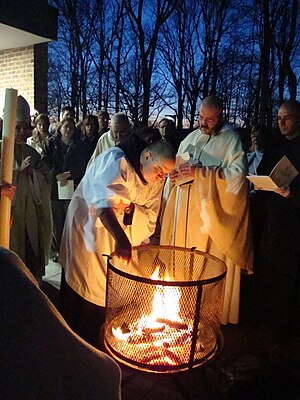a Sermon for the Great Vigil of Easter
Text: Mark 16:1-8
The Down Ending
This may seem strange to you, but this gospel reading is by far my favorite text in Scripture. I absolutely love it. Let’s read the last two verses again:
But go, tell his disciples and Peter that he is going ahead of you to Galilee; there you will see him, just as he told you.” So they went out and fled from the tomb, for terror and amazement had seized them; and they said nothing to anyone, for they were afraid.
And that is where the gospel ends. All of Mark. It ends with these women running away in terror and amazement. They were afraid.

Stop. No epilogue or coda. No flash forward 20 years. Nothing.
And the funniest thing is that this was so uncomfortable to the people who received this gospel in the centuries that followed that they were compelled to add on more ending. The writers responsible for the gospels we know as Matthew and Luke add follow-ups. The same with John. And each, by the way, is different. But the early scribes had real trouble with this ending. They didn’t think it should end this way. It feels horribly unfinished and may even have sent the wrong message. So they added an ending. They tacked it on to make it sound a bit more like Matthew.
What all of these people missed was how profound this ending is and how perfect it is for us on Easter.
Stepping Back
If we step back from what we are used to doing on Easter, which is to philosophize about a human/god hybrid that comes back from the dead and listen to this specific account without the garbage, we might hear something for us in it.
Mary, Mary, and Salome come with spices to anoint Jesus, presumably for a proper burial. They have seen his death with their own eyes and followed to the tomb, so they know where it is. They arrive only to find the tomb without Jesus, but a boy, presumably an angel is there to reassure them and give them instructions.
Their reaction is totally relatable, isn’t it? When Jesus said he would come back on the third day, they believe that they believed him. They just didn’t expect it to happen. He was dead. And they saw it. How could he live?
Relating to Fear
We can relate to that fear, can’t we? That fear of the future, of what is to happen. Of what is to come. We are very fearful of this stuff. And we have no reason to believe our uncertain future, no matter what prophets and angels tell us. We run away and cower in the absence of Jesus. We call out in secret that we wish He would be in our midst to take over again and physically show us the way. We can totally relate. Which is why I think the writers of the gospel we know as Mark intended to end this story about Jesus’s ministry with such an abrupt and fear-inducing ending. Because now, following Jesus isn’t about following an obvious and direct living Christ in our midst, but to follow the risen Christ through the Spirit.
To put it another way, in the resurrection, we are no longer literally following Jesus, but now the Holy Spirit. Another articulation is that we are following Jesus and are compelled by the Holy Spirit. Anyway, our theological statement is not the concern. It is the provocation to new life that comes to us as open-ended. We are no longer a people tied to the specifics of history but the movement of the Spirit in our midst. And this means we can’t afford a satisfying ending. The story can’t be concluded. Because we are living the next part! And if we are living in faith, we move forward from the resurrection liberated and unbound.
These two primal images of this night: the fire and the water both represent death and rebirth: new life in the Spirit. In recommitting ourselves to the Christ mission, we are celebrating in this grand experiment as participants. They are not only opposing metaphors, but matching, identical, pure, fascinating examples of our new life and our commitment. The end to our old selves and the birth of new, more living children of GOD.
Tonight, in this very moment, we celebrate the risen Christ through our worship and our embodiment of the faithful people. Our story is unwritten. Our future is uncertain. Our struggles, like those of the many generations before us, may be many. Nonetheless, we are invited to step out into the unknown assured that even though we might not know the way, Jesus does.
Leave a Reply